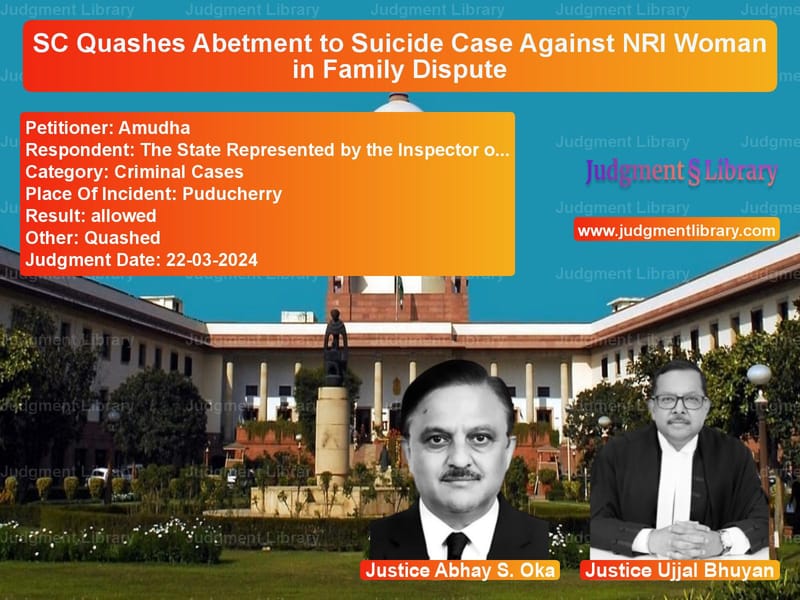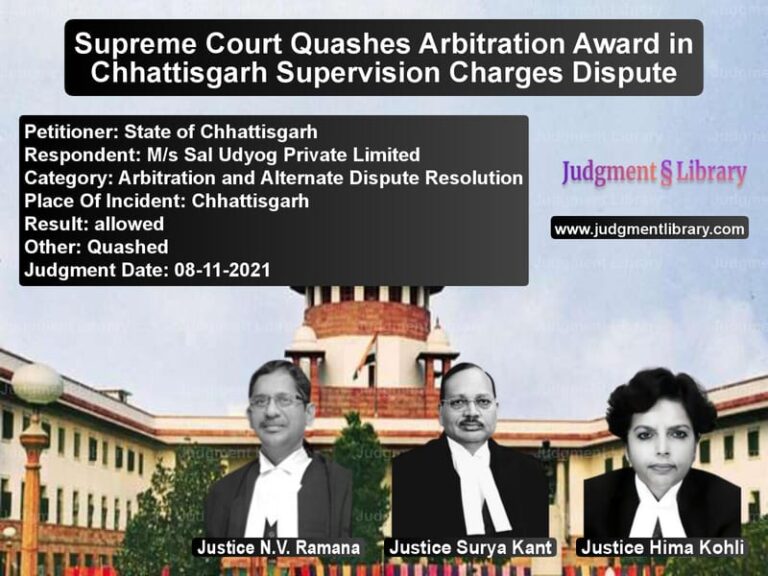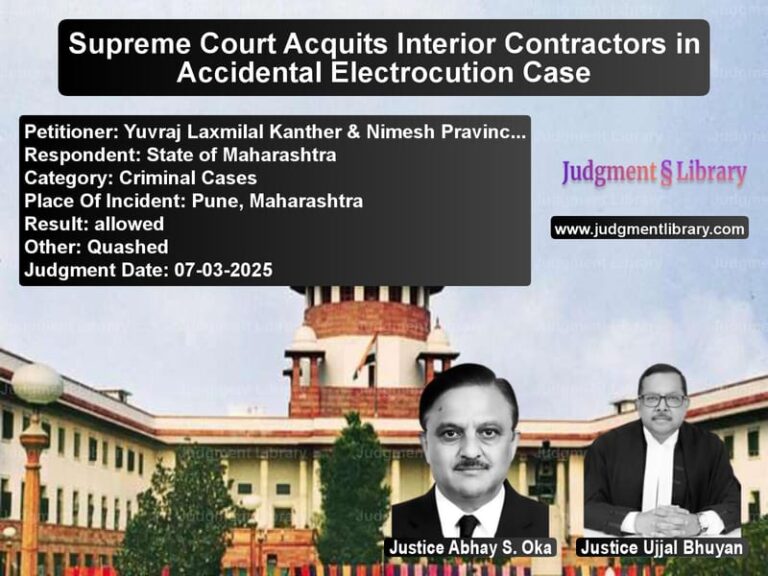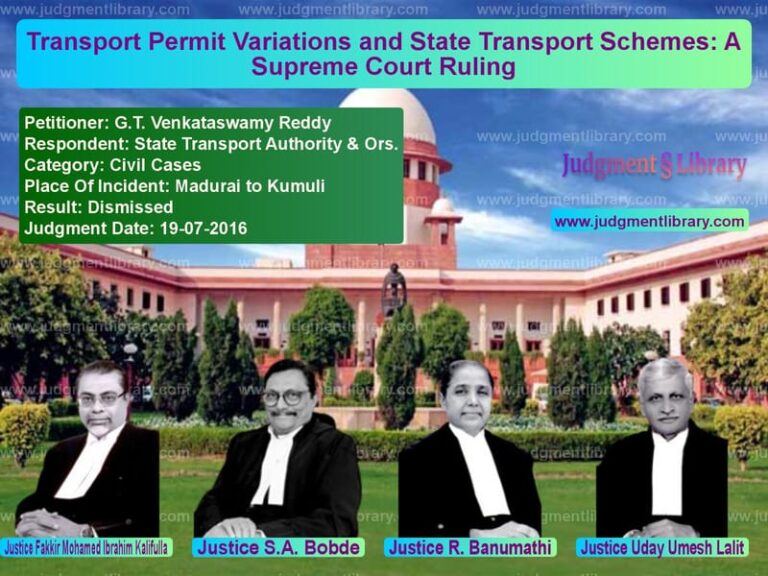SC Quashes Abetment to Suicide Case Against NRI Woman in Family Dispute
The Supreme Court of India recently ruled on an important case involving allegations of abetment to suicide. The case, Amudha vs. The State Represented by the Inspector of Police & Anr., centered on a family dispute over property that allegedly led to the suicide of the complainant’s brother. The Court quashed the criminal proceedings against the appellant, who had been living in the USA and was accused without substantial evidence.
Background of the Case
The case revolves around the tragic death of Kanagasabha, who allegedly committed suicide on March 5, 2020, by consuming poison. The complainant, his sister, claimed that he was harassed by family members, including the appellant, Amudha. According to the complaint:
- Kanagasabha was involved in a dispute over a house he purchased from his brother, Anandraj.
- Another brother, Annamalai, occupied the house with his wife, son, and daughter (Amudha, the appellant) and refused to vacate.
- Despite losing a civil case over the house, Annamalai continued to resist eviction.
- Family members allegedly harassed Kanagasabha by taunting him for being unmarried and urging him to leave or die.
Following his death, the police filed a charge sheet under Section 306 IPC (Abetment to Suicide) against multiple family members, including Amudha.
Legal Issues Considered
1. Can General Allegations of Harassment Constitute Abetment to Suicide?
The key issue was whether the alleged verbal taunts and property dispute could legally be considered “instigation” under Section 306 IPC.
2. Can an Accused Be Prosecuted When They Were Not in the Country?
The appellant had been residing in the USA since September 11, 2019, and had no documented interaction with the deceased in the six months before his suicide.
3. Did the Prosecution Provide Sufficient Evidence?
The charge sheet contained general allegations but lacked specific instances of incitement or coercion by Amudha.
Arguments Presented
Petitioner’s Arguments (Amudha)
- There was no evidence linking her actions to the deceased’s suicide.
- She had been living in the USA since September 11, 2019, and had no communication with the deceased from then until his death on March 5, 2020.
- There was no record of any calls, messages, or interactions between her and the deceased.
- The charge sheet merely contained general allegations without specific incidents of abetment.
Respondent’s Arguments (State of Tamil Nadu)
- It argued that oral evidence from family members suggested that Amudha and others harassed the deceased.
- The trial court should be allowed to examine the facts before the case was quashed.
Supreme Court’s Observations
1. Absence of Instigation
The Court emphasized that under Pawan Kumar v. State of Himachal Pradesh (2017), mere harassment or casual remarks cannot be considered abetment:
“Mere allegation of harassment without any positive action in proximity to the time of occurrence on the part of the accused that led a person to commit suicide does not sustain a conviction under Section 306 IPC.”
Read also: https://judgmentlibrary.com/sc-restores-anticipatory-bail-in-blackmail-and-it-act-case/
2. Lack of Evidence of Contact
The Court pointed out that there was no record of any communication between Amudha and the deceased during the six months before his suicide. It noted:
“No act is attributed to the appellant proximate to the time of the suicide which was of such a nature that the deceased was left with no alternative but to take the drastic step.”
3. Suicide Note Was Insufficient Evidence
The deceased left four suicide notes blaming family members, but the Court ruled that these notes lacked specificity and did not provide evidence of direct provocation.
4. Legal Precedent on Abetment to Suicide
The Court referred to Amalendu Pal v. State of West Bengal (2010), which stated:
“Before holding an accused guilty of an offence under Section 306 IPC, the court must scrupulously examine the facts to assess whether the cruelty and harassment meted out to the victim left no other alternative but to end life.”
Final Verdict
The Supreme Court ruled:
- The proceedings against Amudha were quashed due to a lack of evidence.
- The trial court could continue proceedings against the other accused.
- Amudha was cleared of all charges, and her name was removed from the case.
Key Takeaways
- General harassment does not constitute abetment: Courts require clear evidence of direct incitement before convicting under Section 306 IPC.
- Physical absence from the crime scene matters: If an accused was not present or involved in any way, they cannot be held liable.
- Suicide notes must be specific: A general accusation without corroborating evidence is insufficient for prosecution.
- Legal protection for NRIs: Individuals residing abroad cannot be arbitrarily prosecuted without substantial evidence.
This judgment reaffirms that criminal liability for abetment to suicide requires clear and proximate evidence of incitement, preventing frivolous and baseless prosecutions.
Petitioner Name: Amudha.Respondent Name: The State Represented by the Inspector of Police & Anr..Judgment By: Justice Abhay S. Oka, Justice Ujjal Bhuyan.Place Of Incident: Puducherry.Judgment Date: 22-03-2024.
Don’t miss out on the full details! Download the complete judgment in PDF format below and gain valuable insights instantly!
Download Judgment: amudha-vs-the-state-represente-supreme-court-of-india-judgment-dated-22-03-2024.pdf
Directly Download Judgment: Directly download this Judgment
See all petitions in Suicide Cases
See all petitions in Judgment by Abhay S. Oka
See all petitions in Judgment by Ujjal Bhuyan
See all petitions in allowed
See all petitions in Quashed
See all petitions in supreme court of India judgments March 2024
See all petitions in 2024 judgments
See all posts in Criminal Cases Category
See all allowed petitions in Criminal Cases Category
See all Dismissed petitions in Criminal Cases Category
See all partially allowed petitions in Criminal Cases Category







